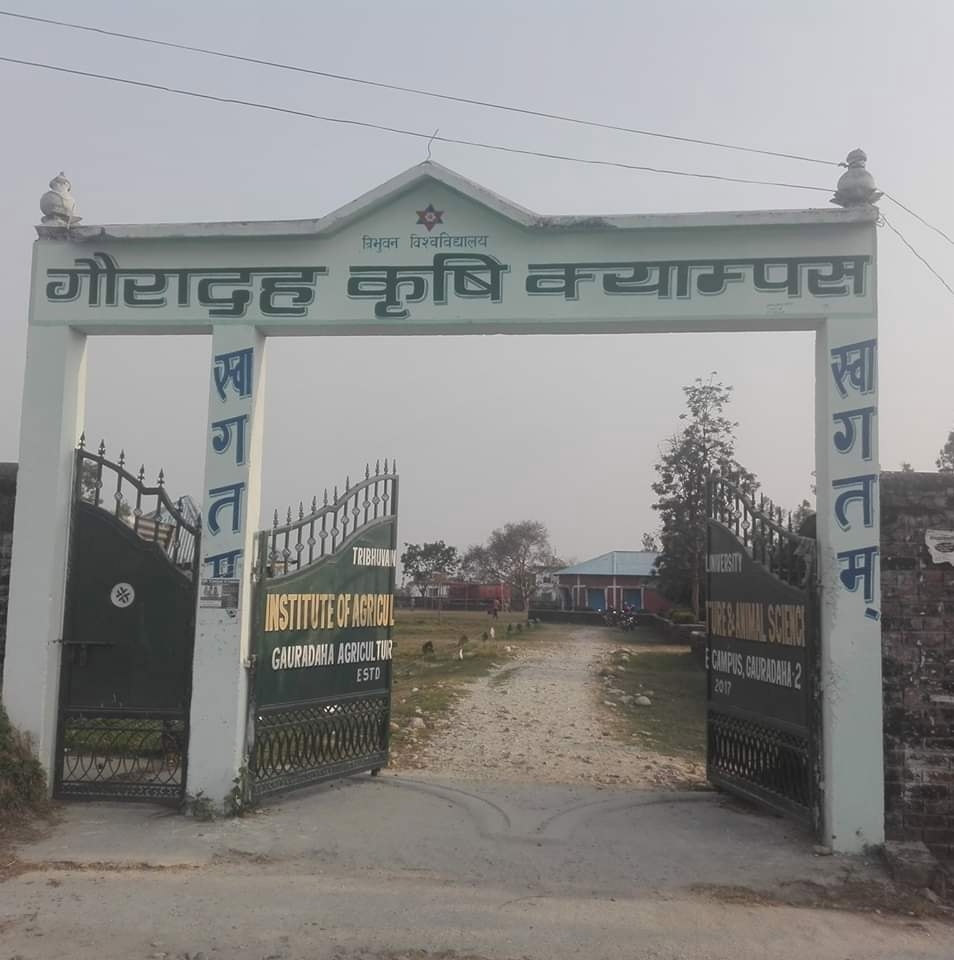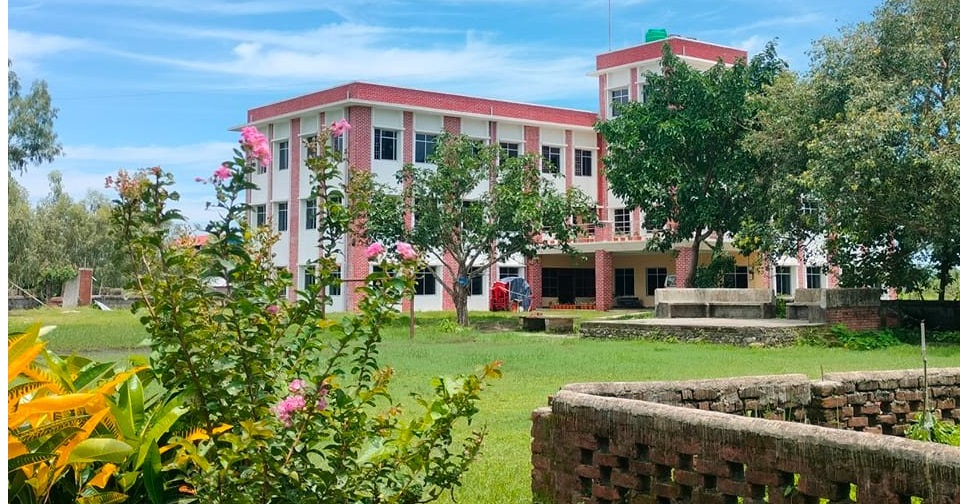Overview
Gauradaha Agriculture Campus (IASS Gauradaha) is the only constituent campus under Tribhuvan University (TU) affiliated with the Institute of Agriculture and Animal Science (IAAS), located in Ward No. 2 of Gauradaha Municipality in Koshi Province.
Since its establishment in 2074 BS (2017 AD), the campus has played a significant role in producing skilled agricultural professionals who contribute to Nepal's evolving agro-economy.
Quick Highlights
-
Affiliation: Tribhuvan University (Institute of Agriculture and Animal Science)
-
Established: 2074 BS (2017 AD)
-
Location: Gauradaha Municipality Ward No. 2, Jhapa, Koshi Province, Nepal
-
Program Offered: Bachelor of Science in Agriculture (B.Sc. Ag.)
-
Academic Duration: 4 years (8 semesters)
-
Campus Area: Approximately 9 bighas (with future expansion planned)
-
Faculty Members: 12 (including full-time and contract-based)
-
Students Enrolled: 240 (Bachelor level only)
-
Student-Faculty Ratio: 18:1

Academic Programs Offered
Bachelor of Science in Agriculture (B.Sc. Ag.)
The core academic program at Gauradaha Agriculture Campus is the four-year, eight-semester B.Sc. Agriculture program. It integrates theoretical instruction with practical applications across diverse agricultural domains. Students undergo extensive classroom learning, field-based exercises, and research-oriented project work.
Key Curriculum Components
-
Basic Sciences and Agricultural Foundations
-
Plant and Soil Science
-
Horticulture and Agronomy
-
Animal Husbandry and Veterinary Basics
-
Agricultural Economics and Extension
-
Field Practicals and Laboratory Work
-
Undergraduate Practicum Assessment (UPA)
-
Final Year Project and Study Visits
Admission Process
Students seeking admission must have completed their 10+2 or equivalent qualification with a science background. Tribhuvan University administers the entrance examination. Admission is competitive, based on merit and entrance performance.
Teaching Faculty and Learning Methodology
The campus employs 8 full-time faculty and hires additional teachers on a contractual basis depending on course requirements. While none currently hold a PhD, faculty members bring practical and academic experience in key agricultural sectors. The teaching methodology combines lectures, lab exercises, and project-based learning.
Faculty support is reinforced through personalized guidance, particularly during the Undergraduate Practicum Assessment and research components. The student–faculty ratio of 18:1 enables close mentorship and timely academic feedback.
Infrastructure and Learning Facilities

The campus is situated on 9 bighas of land, with strategic planning underway to expand infrastructure in alignment with academic needs.
Core Facilities Include:
-
Classrooms: Dedicated lecture halls equipped for theoretical instruction
-
Laboratories: Facilities for soil science, microbiology, agronomy, and horticulture
-
Library: A growing collection of textbooks, journals, and reference materials
-
Research Plots: Used for field demonstrations, experiments, and cultivation
-
Administrative Building: Houses faculty offices, student services, and management
Student Life and Campus Experience
Gauradaha Agriculture Campus offers a close-knit academic community. Students engage in collaborative learning, participate in research activities, and explore real-world agricultural practices.
The campus location in Jhapa offers access to a diverse range of agro-ecological zones. This setting enhances practical training and field-based learning, giving students a firsthand view of diverse agricultural systems.
Extracurricular Activities (ECA)
Beyond academics, the campus encourages students to participate in co-curricular and extracurricular initiatives. These include:
-
Agricultural Seminars and Workshops
-
Student-Led Research Projects
-
Field Exposure Visits to Farms and Research Centers
-
Agri-Fairs and Exhibitions
Scholarships and Financial Support
While institutional scholarships are currently limited, the campus collaborates with the University Grants Commission (UGC) and local government units to facilitate need-based support. Eligible students may apply for financial assistance based on academic performance and economic background.
Faculty, Student, and Staff Data
| Category | Number |
|---|---|
| Total Number of Faculties | 12 |
| Total Number of Female Faculties | 1 |
| Number of Faculties with PhD Degree | 0 |
| Total Number of Students (Bachelor) | 240 |
| Total Number of Female Students | 140 |
| Students in Master's or Ph.D. Levels | 0 |
| Male Staff | 8 |
| Female Staff | 2 |
| Total Faculty + Staff | 22 |
| Student–Faculty Ratio | 18:1 |
| Student–Faculty + Staff Ratio | 11:1 |
Achievements and Institutional Milestones
Since its inception, the campus has made notable progress in expanding its academic reach and physical infrastructure. Key milestones include:
-
Successful operation of B.Sc. Ag. since 2074 BS
-
Field project collaborations with local farmers and cooperatives
-
Regular organization of agricultural exhibitions and awareness programs
The campus continues to strengthen its research base and seeks collaboration with government, NGOs, and private institutions to enhance academic relevance.
Why Choose Gauradaha Agriculture Campus?
-
Only the TU Constituent Agricultural Campus in Koshi Province
-
Dedicated focus on Agriculture Education and Training
-
Practical Curriculum and Research-Driven Learning
-
Close Interaction Between Faculty and Students
-
Growing Facilities and Expansion Plans in Progress
-
Strategic Location for Field-Based Agricultural Learning
Conclusion
Gauradaha Agriculture Campus serves as a crucial institution in Nepal’s agricultural education landscape. With its affiliation to Tribhuvan University and its singular status in Koshi Province, it provides a specialized platform for students seeking to build careers in agriculture.
The campus addresses the need for academically grounded and practically trained professionals who can make meaningful contributions to national development. As the institution continues to expand its infrastructure and academic depth, it remains a vital contributor to Nepal’s agricultural education and rural development.












